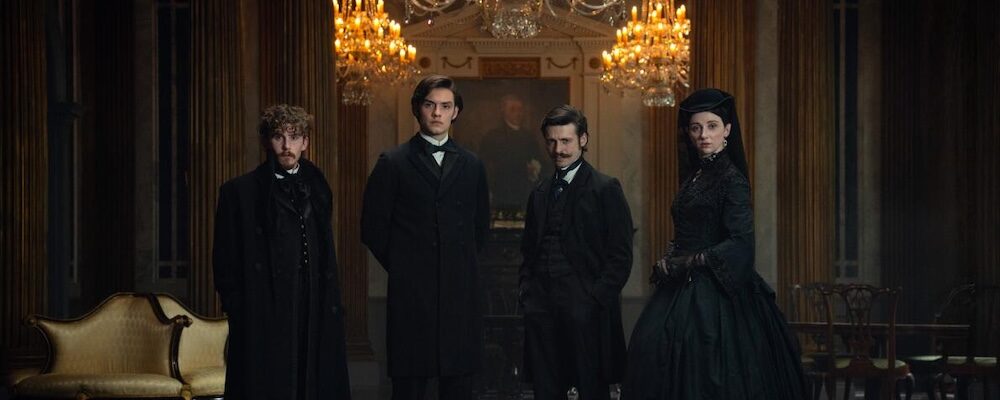Steven Knight’s ‘House of Guinness’ Taps the Sweet Spot Between ‘Succession’ and ‘Peaky Blinders’
Tony Sokol
Netflix’s “House of Guinness” is a stout dynastic drama poured with precision, and just the right amount of fizz. From “Peaky Blinders” creator Steven Knight, this story of the Guinness brewing family is crafted with full-bodied gangster lore, because many great fortunes come from adventurous and pioneering crime.
“House of Guinness” opens with the death of Benjamin Guinness, the grandson of brewery founder Arthur Guinness, which pokes “a stick in a hornet’s nest” in the Guinness family fortunes and future. The two eldest sons, Arthur Guinness (Anthony Boyle) and Edward Guinness (Louis Partridge), are bequeathed joint operation of the family business. Either brother who wants out is denied any part of the Guinness name. The youngest and least settled brother, Benjamin Guinness (Fionn O’Shea), and their sister Anne Plunket Guinness (Emily Fairn) are denied an inheritance outright. Each brother brings dysfunction, and complicated personal demons. Fairn is quietly powerful as the oft-afflicted, but shrewdly efficient Anne Guinness.
The maneuverings begin in earnest, and are unique in their execution. The eight-episode series is not merely a period-piece recreation of “Succession,” but sets up an epic journey of ruthlessness and corporate goodwill, each a tactic in a war for social acceptability. The family wants to realize the father’s ambition of moving into the British aristocracy, by any means necessary. This is similar to Francis Ford Coppola’s crime family epic, “The Godfather,” an allegory of corporate greed. Vito Corleone wants his son Michael to be a senator, possibly president. The Guinness brothers have political ambitions, often at odds with each other, and interesting scandals to keep the series on its toes. The company foreman, Sean Rafferty (James Norton), is a combination of Tom Hagen and Luca Brasi, with benefits.
Partridge and Boyle make the fraternal bonding an arc in itself. Both brothers are secretive, and each find the perfect relationships to usurp the other’s control. The subtext of every conversation bristles with accusation and recognition. Arthur is a gay man in an era when the practice is punishable by 20 years at hard labor. Edward, who knows nothing but the brewing business, is ambitious and calculated. But only to a point, which makes for interesting relations, elevating the series with personally sexual rebellions, and mixing in legendary political upheavals.
The historical drama plays out with the backdrop of the Fenian Uprising, when the Irish Republican Brotherhood mobilized to break from British rule. The Guinness family are traditionally Unionists, who actively oppose Irish independence. Arthur runs for Parliament in the Conservative Party, while Edward tries to bridge the divide. High up in the Fenian hierarchy are Ellen Cochrane (Niamh McCormack), and her brother, Patrick Cochrane (Seamus O’Hara). They become dangerous go-betweens with very different motives. The divergence adds to the suspense, as Patrick can only give vague warnings, and not threats, about extreme consequences. The suspense on this alone is an ever-tightening pincer move to the very last moments of the season’s conclusion. But only one of many.
Jack Gleeson’s interloping bastard character, Byron Hedges, is as far from his King Joffrey role on “Game of Thrones” can be. With Guinness blood on his mother’s side and a dad who died for the Fenian cause, Byron is a young rebel with grand ambitions, a game plan, and tickets to pitch it to the Fenian Brotherhood in New York. He is the most likable character on the series. A true rascal, with deadly inclinations, Gleeson gives Byron enough blarney to charm the Bowery and Dublin, even while being physically threatened, which only seems to whet an appetite for more.
Although the opening clearly states “House of Guinness” is a fictional telling of real events, it expertly mixes the cinematically scaled violence with low-key Guinness history, including evolving health insurance and pensions, and the idea that the family is adhering to a philanthropic company mission in its quest for world dominance. All of these are projected ambiguously, because appearance is of utmost importance to each player, and complex tensions are mined in simple social situations, such as a lunch with a lower-class Fenian in an opulent establishment. Several intense family dramas play out simultaneously, the power struggles are slow-burning, but when they go off, it is dynamite. Ambition and rivalry slam up against the burden of carrying on a legacy, and multiple scandals bring the family together. Until alliances shift, again.
As a period piece, the series recreates the look of the era with detailed respect. The landscapes are visually stunning and textured. Equally immersed in grit and grandeur, the cinematographers capture the dingy street life of Dublin, the ballrooms and boardrooms of wealth, and the backrooms of power. Sequences in New York feel dangerous and jubilant, depending on the streets. The soundtrack tries a little too hard to make the historical stories feel modern.
The story unfolds very much like how Edward describes the pouring of a Guinness, a darkly smooth chill which fizzes depending on the patience of the man at the bottle. It builds slowly, but has a kick. The balance comes by the third episode. The writing is sharp, keeping a subtle tension below each scene, and the melodrama to a minimum. “House of Guinness” is, above all, an extremely fun watch. It’s got a memorably eccentric family, high-stakes gambles, epic consequences, and spills a lot of beer.
“House of Guinness” begins streaming Sept. 25 on Netflix.

